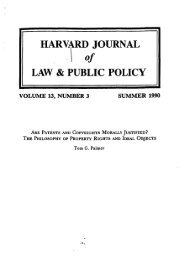G. A. Cohen on Self-Ownership, Property, and ... - Tom G. Palmer
G. A. Cohen on Self-Ownership, Property, and ... - Tom G. Palmer
G. A. Cohen on Self-Ownership, Property, and ... - Tom G. Palmer
Create successful ePaper yourself
Turn your PDF publications into a flip-book with our unique Google optimized e-Paper software.
<strong>Palmer</strong> <str<strong>on</strong>g>Cohen</str<strong>on</strong>g> <strong>on</strong> <strong>Property</strong> <strong>and</strong> Eqrcaliiy 229is owned, by all together, <strong>and</strong> what each may do with it is subject tocollective decisi<strong>on</strong>. The appropriate procedure €or reaching that decisi<strong>on</strong>may be hard to define, but it wil certainly not be open to any<strong>on</strong>e of the joint owners to privatize all or part of the asset unilaterally,no matter what compensati<strong>on</strong> he offers to the rest. . .. . So if jointownership rather than no ownership is, mody speaking, the initialpositi<strong>on</strong>, then B has the right to forbid A to appropriate, even if Bwould benefit by what he thereby forbids. (Ibid., 83)In setting up the problem, <str<strong>on</strong>g>Cohen</str<strong>on</strong>g> (1995, 92) strives to “rec<strong>on</strong>cileself-ownership with equality (or not too much inequality) of c<strong>on</strong>diti<strong>on</strong>,by c<strong>on</strong>structing an ec<strong>on</strong>omic c<strong>on</strong>stituti<strong>on</strong> which combines selfownershipwith an egalitarian approach to raw worldly resources.’’(<str<strong>on</strong>g>Cohen</str<strong>on</strong>g> never makes clear what “not too much inequality” can orshould mean, or how <strong>on</strong>e might know how much was too much.)The principle of joint ownership, according to <str<strong>on</strong>g>Cohen</str<strong>on</strong>g>, when combinedwith strict “self-ownership,” would: I) preclude individual ‘orsubgroup property rights (or property in severalty through subdivisi<strong>on</strong>)through fkee agreement, <strong>and</strong> 2) generate completely equal distributi<strong>on</strong>sof income (or, if any inequalities were to be allowed, theywould not reflect differences in c<strong>on</strong>trol over productive powers, i.e.,they would not be due to <strong>on</strong>e’s property in <strong>on</strong>e’s pers<strong>on</strong>). <str<strong>on</strong>g>Cohen</str<strong>on</strong>g>tries to base both of those c<strong>on</strong>clusi<strong>on</strong>s <strong>on</strong> the rati<strong>on</strong>ality of the parties.The point of <str<strong>on</strong>g>Cohen</str<strong>on</strong>g>’s exerti<strong>on</strong>s is to attempt to show that selfownershipwould not entail rights to several property, or world-ownership,under c<strong>on</strong>diti<strong>on</strong>s of initial joint ownership of resources otherthan labor. <str<strong>on</strong>g>Cohen</str<strong>on</strong>g> claims that no individual or subgroup appropriati<strong>on</strong>can meet a properly formulated Nozickian proviso against harm,so there can be no legitimate individual or subgroup appropriati<strong>on</strong>&om a c<strong>on</strong>diti<strong>on</strong> of no-ownership. His next two steps are to arguethat rati<strong>on</strong>ality would preclude mutually agreeable individual or subgroupdivisi<strong>on</strong> of the jointly owned assets, <strong>and</strong> that it would be irrati<strong>on</strong>alforjoint owners to agree to unequal distributi<strong>on</strong> of their jointproduct. These are the steps I will now c<strong>on</strong>test.Is Unequal Divisi<strong>on</strong> ofjointly Owned Resources Irrati<strong>on</strong>al?The first of <str<strong>on</strong>g>Cohen</str<strong>on</strong>g>’s two rati<strong>on</strong>ality-based arguments c<strong>on</strong>cerns thedivisi<strong>on</strong> of assets (“appropriati<strong>on</strong>”). He rejects individual or subgmup











